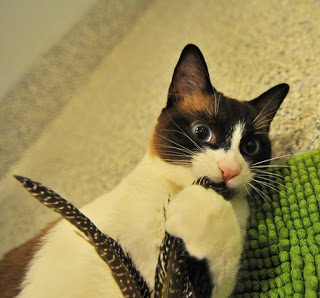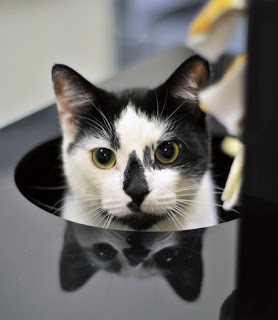January 14, 2016
Seven Things Your Cat Wants You to Know
 Most of us would agree that cats make magnificent pets. They are independent and are so easy to care for. Right? Well… not exactly. The outdated view of cats as self-sufficient and ‘low-maintenance’ has been replaced by the understanding that they are complex, social animals with essential needs which must be fulfilled for them to live healthy lives. Gone is the “Let’s just get a cat” mentality. So whether you have owned cats all your life or are new to the world of cat companionship, consider these seven things your cat would want you to know:
Most of us would agree that cats make magnificent pets. They are independent and are so easy to care for. Right? Well… not exactly. The outdated view of cats as self-sufficient and ‘low-maintenance’ has been replaced by the understanding that they are complex, social animals with essential needs which must be fulfilled for them to live healthy lives. Gone is the “Let’s just get a cat” mentality. So whether you have owned cats all your life or are new to the world of cat companionship, consider these seven things your cat would want you to know:
- Domestic cats are not far-removed from their wild ancestor, the African Wild Cat. Both species are hunters but may also be prey to larger animals. As a result, cats tend to hide signs of sickness rather than ‘advertise’ vulnerability. A subtle change in your cat’s behaviour should always be addressed because this may be an early indication of illness or injury.
- Cats require regular veterinary care. Sadly, cats are taken to the veterinarian only half as often as dogs and they are usually sicker by the time they do receive medical care. Routine health exams (even if your cat never goes outside or appears healthy) are the most effective way to ensure your cat’s good health.
- Another reason cats receive insufficient veterinary care because they (and, therefore, their owners) find the trip to the veterinary clinic stressful. You can lessen your cat’s fear by helping them become accustomed to their cat carrier. Leave the open carrier in a place accessible to your cat all the time (not just the day prior to their appointment) and furnish it with soft bedding. Place food, treats, or catnip in the carrier and let your cat come and go as they please. In time your cat will develop pleasant associations with the carrier and trips to the vet won’t be quite so scary.
- While house soiling is a common reason for cats to be surrendered to shelters, most litter box troubles are both preventable and treatable. Cats need toilet facilities that are to their liking: multiple, large, uncovered litter boxes with unscented, clumping litter are usually best. Locate boxes in areas which are easily accessed by your cat, and clean them daily. Pay particular attention to number, location, and cleanliness of boxes if you have multiple cats. And finally, if there are any changes in your cat’s litter box habits, seek veterinary advice.
 The need to scratch is an essential feline trait. Cats have a strong urge to scratch objects in their environment to mark their territory and condition their claws. Use positive reinforcement to train your cat to scratch appropriate structures (yes – it can be done!) such as cat trees and scratching posts. Your efforts will help prevent furniture damage, surrender to shelters, and declawing.
The need to scratch is an essential feline trait. Cats have a strong urge to scratch objects in their environment to mark their territory and condition their claws. Use positive reinforcement to train your cat to scratch appropriate structures (yes – it can be done!) such as cat trees and scratching posts. Your efforts will help prevent furniture damage, surrender to shelters, and declawing. - Remember – cats are hunters. Feeding your cat should tap into their strong instinct to hunt for their food. Placing dry food in feeding puzzles, hiding a cache of food on the cat perch, or simply feeding multiple, small meals in different parts of the home all go towards making mealtime stimulating and a challenge for your cat.
- Cats need regular physical exercise. Playing with your cat for at least 10 minutes twice a day gives him a mental and physical workout that reduces stress and boredom, improves health, and lets him express natural hunting and play behaviours. Playtime should include games that let your cat stalk and pounce on small, prey-like toys – and be sure to let your cat catch the toy to give them the satisfaction of a successful hunt!

Giving consideration to these seven items will go a long way to keeping cats happy, healthy and at home forever. Attend the Don’t Blame the Cat seminar at the OHS on Jan. 18 for even more tips on cat care and behaviour.
Glenys Hughes, DVM
